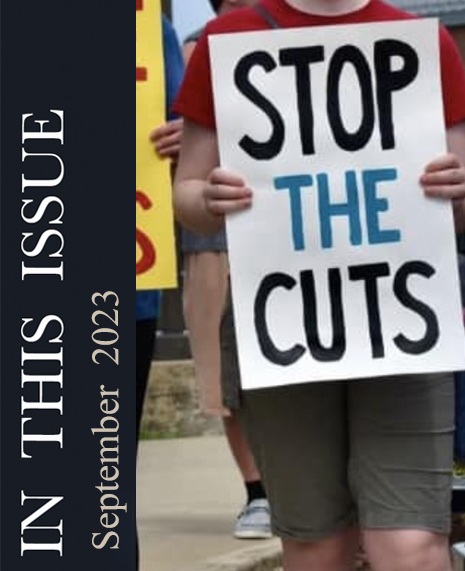 When I set out to curate this month's issue, I sought to explore how ceramic artists "enshrine" the people, places, memories, and visual culture that we hold so dear. Mexican folk art and the shrines of the Arizona borderlands are a visual influence for artist Lisa Marie Barber in her narrative article "Born from the Borderlands." Author Chenoa Baker explores ceramic objects that act as intermediaries between the living and spiritual worlds in her article "Elegy For The Yard That Once Smelled of Ghosts," and the emerging artist Jonny Hamos discusses his practice of creating ceramic sculptures that capture the essence of place and memories.
When I set out to curate this month's issue, I sought to explore how ceramic artists "enshrine" the people, places, memories, and visual culture that we hold so dear. Mexican folk art and the shrines of the Arizona borderlands are a visual influence for artist Lisa Marie Barber in her narrative article "Born from the Borderlands." Author Chenoa Baker explores ceramic objects that act as intermediaries between the living and spiritual worlds in her article "Elegy For The Yard That Once Smelled of Ghosts," and the emerging artist Jonny Hamos discusses his practice of creating ceramic sculptures that capture the essence of place and memories.
Our fourth and FREE article this month is a letter to the public from Shoji Satake regarding the sweeping program and faculty cuts at West Virginia University (WVU). These cuts will destroy a model ceramics program in our nation. I want, if at all possible, not to retroactively build a shrine to the WVU ceramics program. The time has come that we must work to preserve this keystone program in a way that protects and respects the cultural heritage of West Virginia ceramics as well as stabilizes the future of ceramics programs across the nation. It is going to take the creative ingenuity of our community to look beyond the steps already taken.
Shoji and all the faculty of the WVU ceramics program have played by, met, and surpassed the expectations of what the university has asked. In fact, WVU ceramics is the symbolic embodiment that many of our national academic ceramics programs strive for. Shoji himself is a beacon of what a blue-ribbon faculty can and should accomplish in their career: service to the university in terms of department, school, and university; service to the community by promoting cultural legacy and heritage of the local ceramics community; service to students in the study abroad offerings; and of course his personal research in exhibitions, lectures, and national service to other ceramics organizations; all while being a father to two lovely children and the partner of equally esteemed artist Jennifer Allen. Shoji, Jen, and the other faculty of WVU (169+ full-time faculty positions slated for termination) are the good soldiers who played by the rules of the game. Shoji has led with grace, yet amidst all of the service and rule-following, the rug has been pulled out from beneath him. Shoji and the ceramics faculty at WVU stand as the spearheads of a cause that will affect our entire national ceramics community.
What are the next steps when you have followed and surpassed the rules by which you were given to play? How does one persevere when they no longer feel security from their leadership? The administration of WVU is playing a game of finite rules where the winner "saves money," but they have changed the rules and altered the metrics. Simon Sinek outlines this type of finite game theory in his book on modern leadership, The Infinite Game, where he defines finite rules as having known players, fixed rules, and an agreed-upon objective. The WVU administration has changed the agreed-upon objective and has decided to make blind sweeping cuts across the board that are not tethered to program enrollment or achievement; this is no longer a fair game. Because the objectives have changed, we as a ceramics community also need to pivot. We are now playing an infinite game to protect the heritage, culture, and future of our craft. Our "game" has no end because passion, career, and life cannot be measured in trophies.
Universities should be a protected hub of critical thinking and advancement; these proposed cuts will create a culture of toxicity and will stifle, if not abandon altogether, critical thinking. We cannot give in to this type of academic shallowing. Shoji and the faculty at WVU have taken the brunt of this trauma, and now we must lean into our friends; we must be their champion in this time of need, and we must be the second wave of voices to bring Shoji and WVU ceramics the aid they so deserve. No one person should carry this burden, and we cannot see the troubles at WVU as other. This is our fight, and we must band together. If there are no agreed-upon metrics in this fight, then it is essential that we collectively say that this game will be played because it is right, because it is honorable, and because ceramics is a pillar of human civilization.
This month's issue focuses on the ways ceramics artists enshrine the values and ideas that are important to us individually and universally. Please read Shoji’s letter to the public; this is a call to action with information on how you can help us protect WVU ceramics.

Randi O’Brien, editor
Studio Potter would love to hear more from our readers in letters to the editor about how we can continue proactive steps to enshrine all of our ceramics programming, both traditional as in universities and non-traditional as in apprenticeships.
